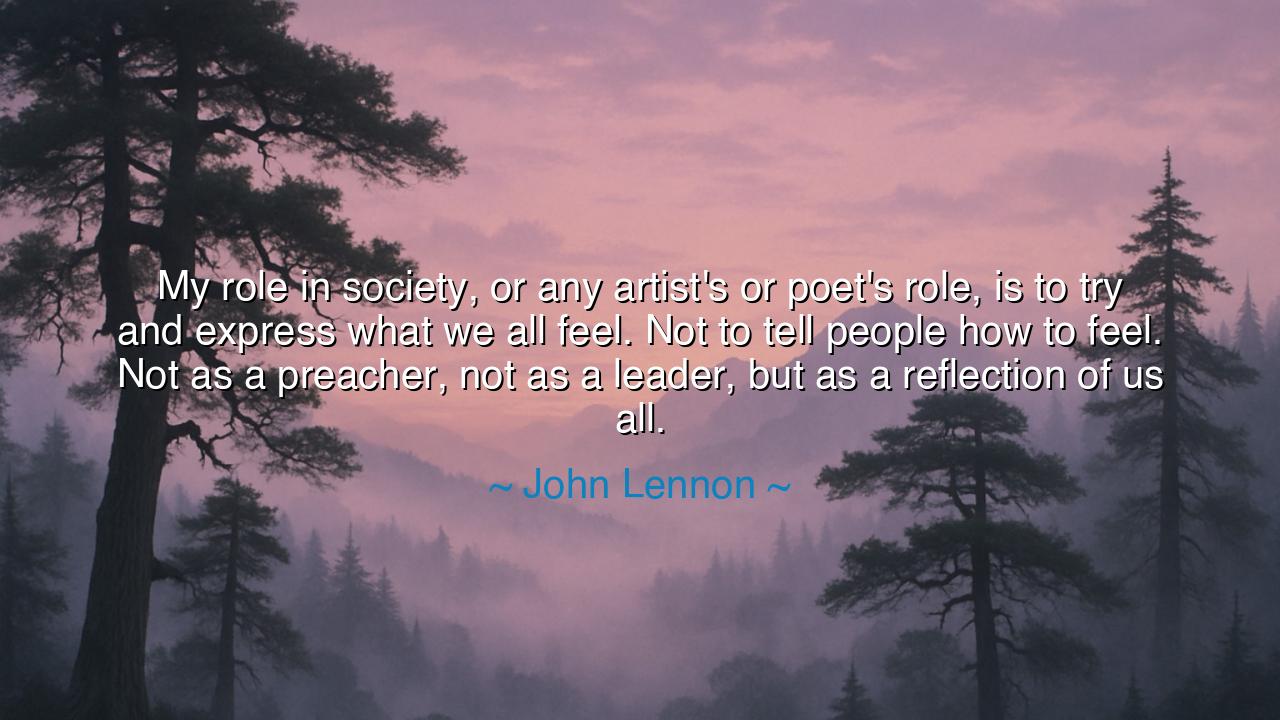
My role in society, or any artist's or poet's role, is to try and
My role in society, or any artist's or poet's role, is to try and express what we all feel. Not to tell people how to feel. Not as a preacher, not as a leader, but as a reflection of us all.






Hear the words of John Lennon, singer of dreams and witness to the longings of humankind: “My role in society, or any artist’s or poet’s role, is to try and express what we all feel. Not to tell people how to feel. Not as a preacher, not as a leader, but as a reflection of us all.” These words shine with humility, yet carry the weight of timeless wisdom. For they remind us that the true artist is not a tyrant of emotions nor a master of thought, but a mirror polished by love, pain, and vision, in which the people may behold themselves.
The artist’s role is thus not to command but to reveal, not to instruct but to uncover. The poet is a vessel of the collective soul, listening to the whispers that others cannot articulate, and giving them voice in word, sound, or image. To be a reflection of all is to carry both joy and sorrow, triumph and despair, hope and fear, and to make them visible in a way that resonates across hearts. The artist does not invent the ocean—he simply shows us its depths.
Consider the great Homer, whose epics endured across centuries. Did he stand before the Greeks as a preacher or a leader? No—he sang of their grief and their glory, of their longing for home and their hunger for honor. In Achilles’ wrath and Odysseus’ wandering, the people of Greece saw themselves reflected. Through his verses, they recognized what it meant to be human—fragile yet striving, wounded yet unyielding. Homer did not dictate their feelings; he revealed them. And in that revelation, an entire civilization found its story.
So too with Lennon himself, who, through song, gave voice to the dreams and discontents of a generation. When he sang of peace, he was not commanding hearts to abandon war—he was giving shape to the yearning already within millions, a yearning they could scarcely express. When he wrote of love, of loss, of longing, he did not build these feelings; he reflected them. That is why his words endure—not as sermons, but as echoes of the human spirit.
The wisdom here is profound: beware of those who call themselves artists but seek dominion over the minds of men, for they betray their sacred calling. True creation does not enslave—it liberates. It does not dictate—it awakens. The genuine poet or artist offers a mirror, and in that mirror each person sees their own truth. In this way, art unites us, for though our lives differ, our inner feelings are woven of the same cloth of humanity.
The lesson, then, is this: embrace art not as commandment but as revelation. When you hear the song, read the poem, or gaze upon the painting, do not ask, “What should I feel?” Ask instead, “What truth of mine is revealed here?” And if you yourself create, let your work be a mirror, not a throne. Seek not to dominate with your vision, but to uncover what already lives in the hearts of others.
Therefore, O listener, let your actions be these: honor the artists in your midst, for they are not idols to be worshiped, but mirrors to be cherished. When you speak, write, sing, or paint, strive to reveal, not to command. And when you encounter art, receive it not as law but as an invitation to recognize your own humanity. For in this way, the artist becomes not master, but servant of truth, and the reflection they offer becomes the bond that unites us all.






AAdministratorAdministrator
Welcome, honored guests. Please leave a comment, we will respond soon